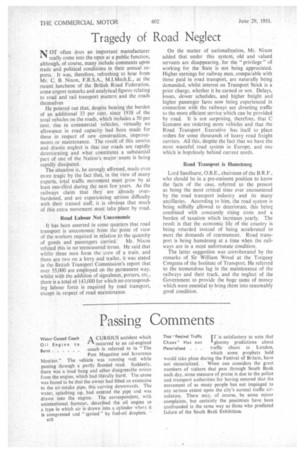Tragedy of Road Neglect
Page 44

If you've noticed an error in this article please click here to report it so we can fix it.
NOT often does an important manufacturer really come into the open at a public function, although, of course, many include comments upon trade and political conditions in their annual reports. It was, therefore, refreshing to hear from Mr. C. B. Nixon, F.R.S.A., M.I.Mech.E., at the recent luncheon of the British Road Federation, some cogent remarks and analytical figures relating to road and rail transport matters and the roads themselves
He pointed out that, despite bearing the burden of an additional 33 per cent. since 1938 of the total vehicles on the roads, which includes a 50 per cent. rise in commercial vehicles, virtually no allowance in road capacity had been made for these in respect of new construction, improvements or maintenance. The result of this unwise and drastic neglect is that our roads are rapidly deteriorating and what constitutes a substantial 'part of one of the Nation's major assets is being rapidly dissipated. The situation is, he strongly affirmed, made even more tragic by the fact that, in the view of many experts, total traffic movement must grow by at least one-third during the next few years. As the railways claim that they are already overburdened, and are experiencing serious difficulty with their trained staff, it is obvious that much of this extra movement must take place by road.
Road Labour Not Uneconomic It has been asserted in some quarters that road transport is uneconomic from the point of view of the workers required in relation to the quantity
of goods and passengers carried. Mr. Nixon refuted this in no-unmeasured terms. He said that whilst three men form the crew of a train, and there are two on a lorry and trailer, it was stated in the British Transport Commission's report that over 55,000 are employed on the permanent way, whilst with the addition of signalmen, porters, etc., there is a total of 143,000 for which no corresponding labour force is required by road transport, except in respect of road maintenance. On the matter of nationalization, Mr. Nixon added that under this system, old and valued servants are disappearing, for the " privilege" of working for the State is not being appreciated. Higher earnings for railway men, comparable with those paid in road transport, are naturally being demanded, whilst interest on Transport Stock is a prior charge, whether it be earned or not. Delays, losses, slower schedules, and higher freight and higher passenger fares now being experienced in connection with the railways are diverting traffic to the more efficient service which can be provided by road. It is not surprising, therefore. that C licensees are ordering more vehicles and that the Road Transport Executive has itself to place orders for some thousands of heavy road freight carriers. All this, despite the fact that we have the most wasteful road system in Europe. and one which is hopelessly behind current needs.
Road Transport is Hamstrung Lord Sandhurst, 0.B.E., chairman of the B.R.F., who should be in a pre-eminent position to know the facts of the case, referred to the present as being the most critical time ever encountered by the road transport industry and its many ancillaries. According to him, the road system is being wilfully allowed to deteriorate, this beiii! combined with constantly rising costs and a burden of taxation which increases yearly. The result is that the economic life of the country is being retarded instead of being accelerated to meet the demands of rearmament. Road transport is being hamstrung at a time when the railways are in a most unfortunate condition.
The latter suggestion was corroborated by the remarks of Sir William Wood at the Torquay Congress of the Institute of Transport. He referred to the tremendous lag in the maintenance of the railways and their track, and the neglect of the Government to provide the huge sums of money which were essential to bring them into reasonably good condition.












































































































































